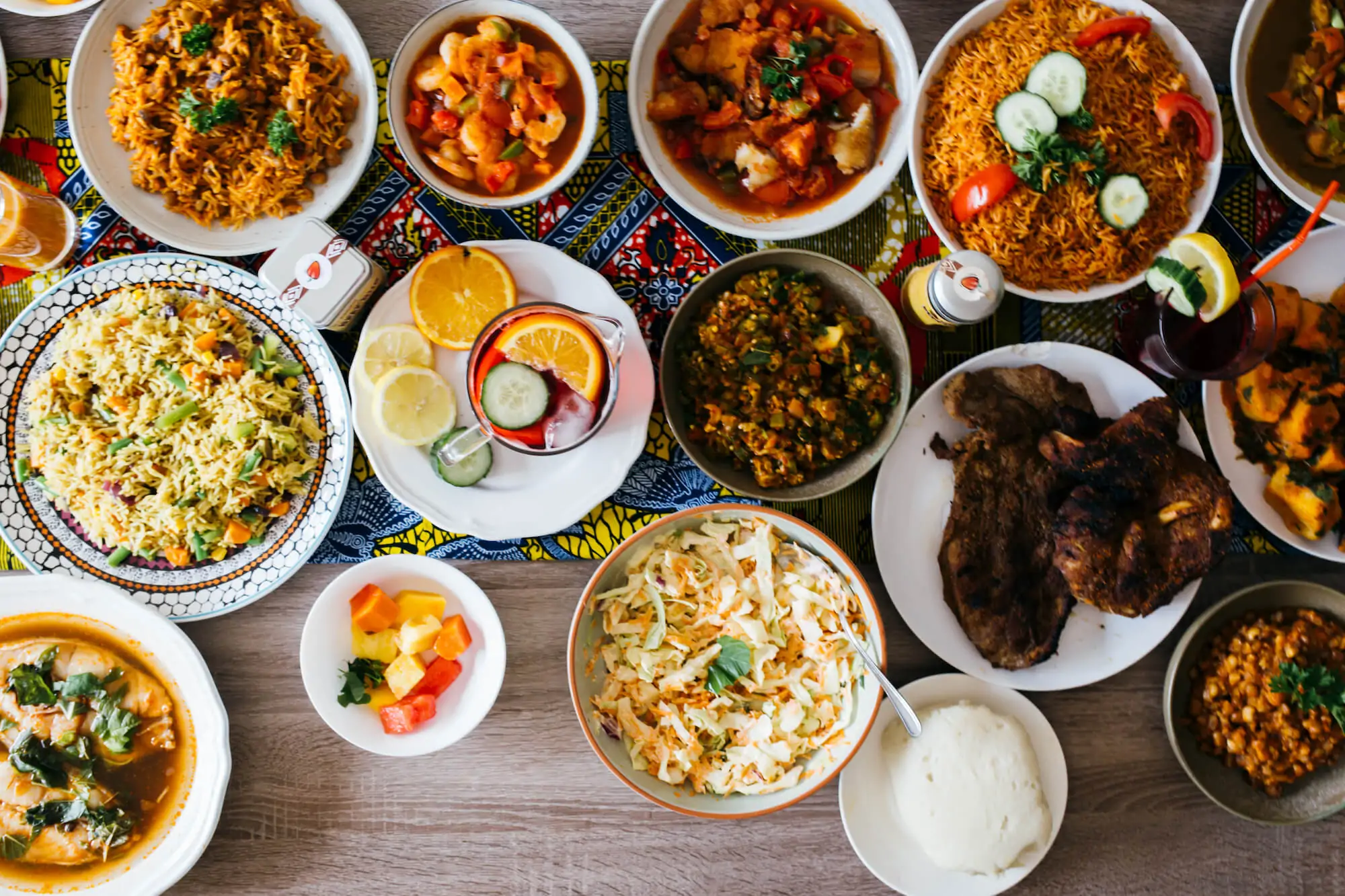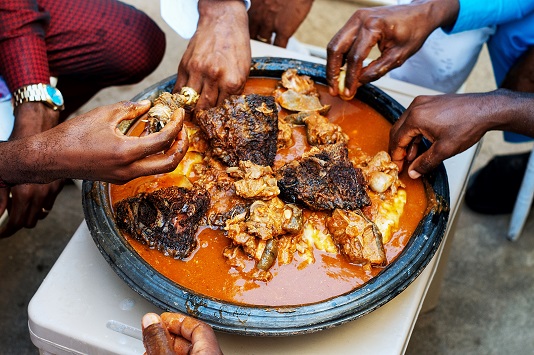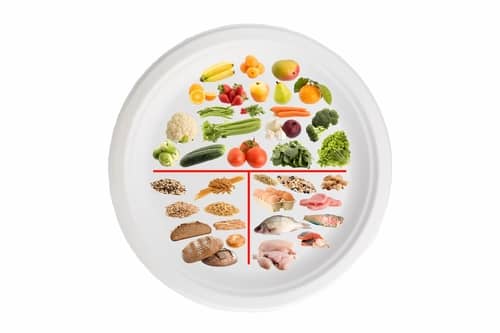African Foods and the Culture of Portion Control

Go to an average African wedding, you are likely to find out that about four (4) heavy meals were served within just few hours of the receptionceremony. And African guests are likely to devour everything, not because of greed or gluttony, but to showcase love and support.
In most African homes, food is more than nourishment, it is a literal affection served on a plate. And this has become the cultural significance of meals in every setting in Africa.
In many households, a meal that doesn’t leave you full till your stomach feels like a shotput ball feels incomplete and almost disrespectful. Yet, in a world increasingly concerned about health and longevity, the idea of portion control is challenging long-held notions about what it means to eat well.

Food as a Symbol of Love and Identity
To understand the conversation around portion control in Africa, one must first understand how Africans view food. Across different ethnic groups, cooking and sharing food is a language of love, both personal and communal love.
A mother piling extra ladles of soup into her child’s bowl, a host insisting “take more,” or friends eating from the same tray are all gestures of warmth. Abundance is not a waste. Africans take pride in it.
From the Yoruba “O yẹ ki àlejò jẹun kó yó” (a guest must eat until satisfied) to the Ghanaian culture of serving heaping plates during celebrations, generosity defines African food culture. Food is intertwined with identity, gratitude, and social belonging.
For centuries, abundance symbolised success, fertility, and even divine favour. In agrarian societies where food scarcity once posed real threats, eating well became a mark of blessing and by extension, large portions became normalized.

What Portion Control Really Means
Portion control is not about starvation or strict dieting. It simply refers to eating the right amount of food, not too much, not too little, to maintain nutritional balance and overall health. It recognizes that even healthy foods can be harmful when consumed in excess.
In many Western nutrition models, portion control is taught through portion sizes, calorie awareness, or plate ratios (half vegetables, a quarter protein, a quarter carbohydrates). But in African settings, where meals are communal and measurement is intuitive, portion awareness is less emphasised.
The challenge lies not in what we eat as African cuisines are rich in natural ingredients but in how much we eat and how we combine our foods.
Traditional Eating Habits and the Love for Abundance
A typical African meal is both hearty and satisfying. Carbohydrate foods such as pounded yam, rice, cassava, plantain, and maize-based meals dominate many diets. Meals often feature large servings of these energy-heavy foods paired with soups or stews rich in oil and protein.
Historically, this made sense. Africans were predominantly farmers, traders, and manual labourers. Heavy meals provided the energy needed for long, physically demanding days. Eating to fullness was practical and necessary.
But with urbanisation and modern lifestyles where many now spend hours seated in offices rather than on farms, the same eating patterns have become less compatible with daily energy needs.
In fast-paced African cities like Lagos, Nairobi, and Johannesburg, the fast-food boom is also reshaping eating habits. While convenience foods have become more accessible, portion sizes remain large, often double the recommended serving.
The cultural attachment to fullness still lingers, even when nutritional needs have changed.
Health Implications of Overeating
The growing concern among African nutritionists is clear: lifestyle diseases are on the rise. Conditions once considered “Western problems” like obesity, hypertension, and type 2 diabetes, are increasingly prevalent.
According to the World Health Organization, obesity rates in Africa have nearly tripled since the 1970s, with urban areas being most affected.
The issue is not that African foods are unhealthy. In fact, many are incredibly nutritious. The problem is portion distortion.
For instance, a large bowl of eba eaten twice daily, combined with soda drinks or fried snacks, can exceed. Similarly, meat-rich soups or oil-rich stews add more fats than necessary. Over time, this imbalance contributes to weight gain and metabolic disorders.
Nutritionists argue that portion control does not mean abandoning African foods. Rather, it means rethinking proportions.
A smaller serving of swallow paired with more vegetables or lean protein can create a healthier balance without losing cultural flavour.
Finding Harmony: Portion Control the African Way
The beauty of African cuisine lies in its adaptability. Small, mindful changes can make a big difference.
For example, reducing the size of fufu balls or substituting white rice with local grains like ofada, millet adds more fiber and nutrients.
Steaming or grilling meats instead of frying them can cut down on fat intake.
Another effective approach is the “plate method”: half vegetables, one-quarter protein, and one-quarter carbohydrates, can also be easily applied to local dishes.
A plate of rice, beans, and vegetable sauce fits perfectly within this guideline. Even the communal eating tradition can work in favour of moderation if families serve smaller quantities and encourage everyone to listen to their body’s cues rather than social pressure to “finish your food.”
Education and awareness are key. Many Africans still equate portion control with “eating less,” when it is truly about “eating smart.” Nutrition workshops, school programs, and online wellness influencers are slowly reshaping these perceptions, promoting healthy eating without erasing cultural pride.
Redefining the Narrative
Embracing portion control does not mean Westernizing African diets; it means reclaiming balance. Traditional African meals were once naturally portioned.
Let's think of the modest servings of tuwo or ugali eaten with rich vegetable sauces and shared communally. It is modernization and overabundance that tilted the scales.
Across Africa, a new wave of health-conscious individuals and chefs are reviving this balance. The message is spreading that moderation is the new sophistication.
Food can still be love, identity, and celebration but should also be self-care.
Moderation without Losing Culture
African cuisines will always hold pride of place. The colours they bring to the table, the aroma they bring to the air, rooted in centuries of their tradition.
But as health consciousness grows, so must our understanding of balance. Portion control doesn’t strip African food of its warmth or meaning; it simply refines how we enjoy it.
In the end, eating well is not about eating less. It is about eating with intention, savouring the taste, honouring the culture, and respecting the body that carries it all. After all, food should fill the stomach, yes, but it should also sustain the future.
Recommended Articles
There are no posts under this category.You may also like...
Explosive Racism Claims Rock Football: Ex-Napoli Chief Slams Osimhen's Allegations

Former Napoli sporting director Mauro Meluso has vehemently denied racism accusations made by Victor Osimhen, who claime...
Chelsea Forges Groundbreaking AI Partnership: IFS Becomes Shirt Sponsor!

Chelsea Football Club has secured Artificial Intelligence firm IFS as its new front-of-shirt sponsor for the remainder o...
Oscar Shockwave: Underseen Documentary Stuns With 'Baffling' Nomination!

This year's Academy Awards saw an unexpected turn with the documentary <i>Viva Verdi!</i> receiving a nomination for Bes...
The Batman Sequel Awakens: Robert Pattinson's Long-Awaited Return is On!

Robert Pattinson's take on Batman continues to captivate audiences, building on a rich history of portrayals. After the ...
From Asphalt to Anthems: Atlus's Unlikely Journey to Music Stardom, Inspiring Millions

Singer-songwriter Atlus has swiftly risen from driving semi-trucks to becoming a signed artist with a Platinum single. H...
Heartbreak & Healing: Lil Jon's Emotional Farewell to Son Nathan Shakes the Music World

Crunk music icon Lil Jon is grieving the profound loss of his 27-year-old son, Nathan Smith, known professionally as DJ ...
Directors Vow Bolder, Bigger 'KPop Demon Hunters' Netflix Sequel

Directors Maggie Kang and Chris Appelhans discuss the phenomenal success of Netflix's "KPop Demon Hunters," including it...
From Addiction to Astonishing Health: Couple Sheds 40 Stone After Extreme Diet Change!

South African couple Dawid and Rose-Mari Lombard have achieved a remarkable combined weight loss of 40 stone, transformi...
